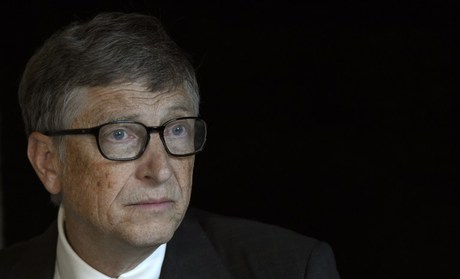Gates: World Must Prepare for 'War' against a Global Pandemic

Billionaire philanthropist Bill Gates says the world must use the lessons from battling Ebola to prepare for any future "war" against a global killer disease, with the help of new technology.
Gates, in Berlin for a donor conference of the GAVI alliance bringing vaccines to poor countries, said the risk of a worldwide pandemic meant it was reckless not to act now.
"A more difficult pathogen (than Ebola) could come along, a form of flu, a form of SARS or some type of virus that we haven't seen before," he said in an interview with Agence France Presse.
"We don't know it will happen but it's a high enough chance that one of the lessons of Ebola should be to ask ourselves: are we as ready for that as we should be? A good comparison is that we prepare ourselves for war -- we have planes and training and we practise."
He said this included building teams of volunteers who are ready to mobilise quickly in a public health emergency, similar to schemes developed in the countries hit hardest by Ebola: Guinea, Liberia and Sierra Leone, which registered almost 9,000 deaths in the last year.
- 'Biggest saver of lives' -
Gates, ranked by Forbes magazine as the world's richest man with a net worth of some $80 billion (70 billion euros), said the Bill and Melinda Gates Foundation distributes about $4 billion each year to help the world's neediest.
It is also a major contributor to the GAVI alliance, which Tuesday drew pledges of $7.5 billion to help immunise 300 million more children in developing countries over the next five years.
Calling vaccines the "biggest saver of lives" worldwide, the 59-year-old praised German Chancellor Angela Merkel for hosting the GAVI conference and making vaccinations a priority of her G7 presidency this year.
However he said he was "concerned" about an anti-vaccination trend in the West, due to exaggerated fears of risks associated with the jabs, that was leading to dangerous outbreaks.
"Our focus is on the poor children where you have millions that die of vaccine-preventable disease. It's unfortunate that you're not getting 100-percent coverage in the rich countries," he said.
"They're choosing to potentially infect somebody who can't protect themselves," he said, noting the renewed spread of illnesses such as measles and pertussis (whooping cough).
"I'm glad there are people who are championing reducing these misunderstandings in rich countries because of the risk that creates."
- Tech to gauge progress -
The Microsoft co-founder said that technology was a crucial asset in his foundation's field work, seen most recently in a drive against polio.
"We use satellite photos to find out where people are living, we use a GPS tracker with a cell phone so that we can see if the vaccine team is going to every place they're supposed to go, we do statistical analysis within a few days to see if there's any kids that we missed," he said.
"Measurement is a pretty natural private sector thing... Innovative new technologies are going to make it possible to see what's going on with far less cost."
Gates said he was proud to have inspired fellow American billionaires such as Warren Buffett to devote a big slice of their wealth to charity and was working to spread the message in Europe, India and China.
"Everywhere I go, I sit down and talk to people about how much I enjoy my philanthropy and I encourage others to get involved," he said.
Gates said moving from the world of big business to working in villages in the developing world where people "have no idea who I am" had been satisfying.
"I was super proud of the work I did at Microsoft... it let me carry the message of software out into the world in a very enthused way," he said.
"Now I have a different message, my wife and I, that we should be generous to the poor. To the degree I have visibility hopefully I'm using that in a positive way."



